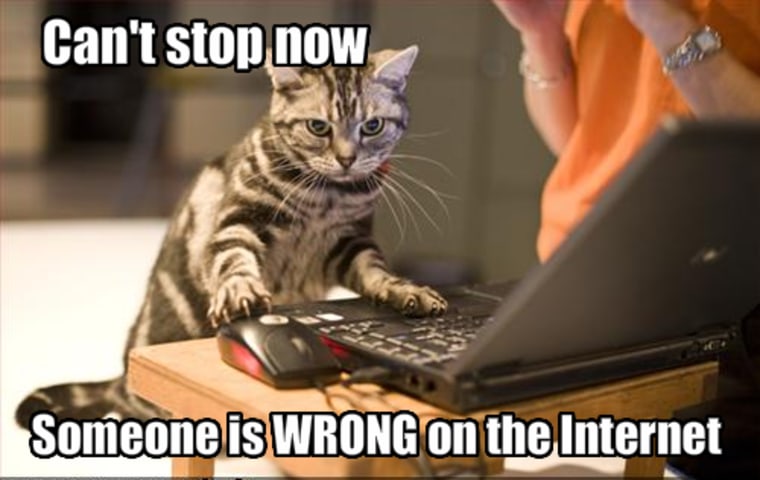Hey, you! Want more social media "buzz" in your life?
Then forget about so-called social media consultants and how-to guides. If you're looking to engage your Facebook friends, get things going on Twitter, or attract commenters on your hipster-themed Tumblr blog, stop messing around and start pissing people off. It's science!
According to a study by U.K. research group Statistical Cybermetrics, cyberspace citizens are overwhelmingly attracted to the negative. (Gasp!)
To confirm this fairly obvious fact, researchers used an algorithm called "sentiment analysis" to identify emotional content in posts left on the BBC's online discussion forums and the link-sharing website digg.com, reports New Scientist.
Pinpointing keywords, emoticons and subtle linguistic markers such as misspellings, the algorithm calculated a "happiness score" for each post. "Long conversation threads are overwhelmingly more emotionally negative than short ones, with happiness scores decreasing logarithmically with the number of messages," writes New Scientist. "What's more, long conversations almost always start with negative comments."
No doubt you needn't go beyond your personal Internet experience to find an example, or even the headlines. Case in point: Bristol and Willow Palin's recent Facebook flame war which began after during the premiere of their family's TLC reality show.
"'Sarah Palin's Alaska' is failing so hard right now," posted one Facebook user as his status update. Along came the Palin sisters, with curse words and homosexual epithets aplenty.
"That's it — all it takes to start a fight that continued for dozens of posts and drew in a dozen mudslingers and rubberneckers over the course of about an hour," writes Emily Bazelon in a Slate analysis of the flame war.
Indeed. "If you want a long chat, don't start by saying 'I love this!', at least not online," says Mike Thelwall, head of the research group that conducted the study.
Nothing brings people together like low happiness scores, the study found. An avalanche of posts containing negative keywords, emoticons and misspellings will generate a social group from nowhere, Thelwall told New Scientist. Often all it takes is a single provocative post to create a community ready to throw down — at least online.
Consider the case of Cooks Source, a small, regional magazine recently taken down by an angry Internet mob. In a LiveJournal blog entry, a freelance writer wrote about her frustration after she confronted Cooks Source about publishing her apple pie story without permission.
The blogger included portion of the Cooks Source editor's pedantic response in entry, the most "provocative" portion of the entry. In it, the editor incorrectly claimed the blogger's story was "public domain," and added, "We put some time into rewrites, you should compensate me!"
"Oh no she din't!" howled the Internet. Thousands of messages of SHAME littered the Cooks Source Facebook fan page, fake Twitter pages lampooning the magazine popped up, the editors' home phone numbers and addresses were published online, and Cooks Source advertisers were harassed.
In a single day dedicated Web surfers (who never met the wronged blogger) crowdsourced other examples of possible Cooks Source plagiarism. Two weeks after the maelstrom began, the magazine announced its end.
"This is all typical human behavior, turns out. "There is evidence that group cohesiveness may be related to negative feelings about others," Tom Buchanan, a psychologist at the University of Westminster in London, told New Scientist. "Members of an online community might unite around a perceived attack on them or some aspect of their identity."
If you're looking to kick up some action online, religion and politics are a couple of surefire subjects that will unite or divide a crowd. But if avoiding conflict in cyberspace is more your cup of tea, lots of people seem interested in Keith Richards' new biography "Life."
According to head researcher Thelwell, "We've seen that the least vigorous discussions tend to be about aging rock stars."
Helen A.S. Popkin's negative keywords, emoticons and misspellings will generate a social group from nowhere. Find out when you follow her on and/or
